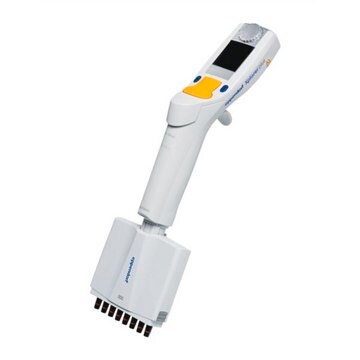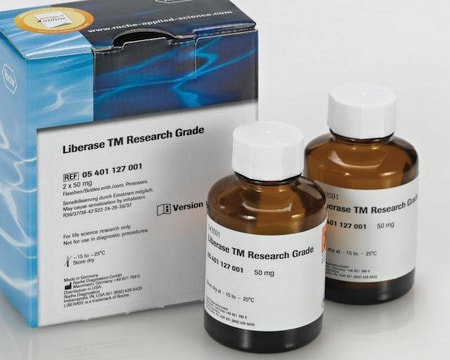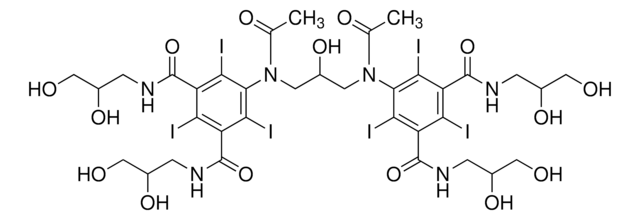Wszystkie zdjęcia(1)
Kluczowe dokumenty
G9779
Gey′s Balanced Salt Solution
liquid, sterile-filtered, suitable for cell culture
Synonim(y):
GBSS
Zaloguj sięWyświetlanie cen organizacyjnych i kontraktowych
About This Item
Kod UNSPSC:
12352207
NACRES:
NA.75
Polecane produkty
sterylność
sterile-filtered
Poziom jakości
Formularz
liquid
metody
cell culture | mammalian: suitable
zanieczyszczenia
endotoxin, tested
komponenty
glucose: 1.0 g/L
phenol red: no
NaHCO3: 2.27 g/L
Warunki transportu
ambient
temp. przechowywania
2-8°C
Opis ogólny
Gey′s Balanced Salt Solution is a phosphate bicarbonate buffered cell suspension and washing solution. A complete balanced salt solution with a unique combination of ""salt forms"". Contains the same five basic ions as EBSS, HBSS and DPBS.
Zastosowanie
Gey′s Balanced Salt Solution has been used in:
- organotypic mouse brain slice culture
- isolation of primary murine liver sinusoidal endothelial cells (LSECs)
- organotypic hippocampal slice cultures
Ta strona może zawierać tekst przetłumaczony maszynowo.
Kod klasy składowania
12 - Non Combustible Liquids
Klasa zagrożenia wodnego (WGK)
nwg
Temperatura zapłonu (°F)
Not applicable
Temperatura zapłonu (°C)
Not applicable
Wybierz jedną z najnowszych wersji:
Masz już ten produkt?
Dokumenty związane z niedawno zakupionymi produktami zostały zamieszczone w Bibliotece dokumentów.
Klienci oglądali również te produkty
Victor Olsavszky et al.
Gene, 768, 145284-145284 (2020-11-02)
The Class H scavenger receptors Stabilin-1 (Stab1) and Stabilin-2 (Stab2) are two of the most highly expressed genes in liver sinusoidal endothelial cells (LSECs). While Stab1-deficient (Stab1KO) and Stab2-deficient (Stab2KO) mice are phenotypically unremarkable, Stab1/2-double-deficient (StabDKO) mice exhibit perisinusoidal liver
Tim C Chang et al.
Lab on a chip, 14(23), 4540-4551 (2014-10-03)
There is a critical unmet need to tailor chemotherapies to individual patients. Personalized approaches could lower treatment toxicity, improve the patient's quality of life, and ultimately reduce mortality. However, existing models of drug activity (based on tumor cells in culture
Pei-Hsuan Wu et al.
Nature genetics, 52(7), 728-739 (2020-07-01)
Pachytene PIWI-interacting RNAs (piRNAs), which comprise >80% of small RNAs in the adult mouse testis, have been proposed to bind and regulate target RNAs like microRNAs, cleave targets like short interfering RNAs or lack biological function altogether. Although piRNA pathway
Dan Xu et al.
The Journal of experimental medicine, 215(4), 1169-1186 (2018-03-01)
The pathophysiology of drug-resistant pediatric epilepsy is unknown. Flow cytometric analysis of inflammatory leukocytes in resected brain tissues from 29 pediatric patients with genetic (focal cortical dysplasia) or acquired (encephalomalacia) epilepsy demonstrated significant brain infiltration of blood-borne inflammatory myeloid cells
Soichiro Yamanaka et al.
Developmental cell, 51(1), 21-34 (2019-09-03)
Facultative heterochromatin forms and reorganizes in response to external stimuli. However, how the initial establishment of such a chromatin state is regulated in cell-cycle-arrested cells remains unexplored. Mouse gonocytes are arrested male germ cells, at which stage the genome-wide DNA
Nasz zespół naukowców ma doświadczenie we wszystkich obszarach badań, w tym w naukach przyrodniczych, materiałoznawstwie, syntezie chemicznej, chromatografii, analityce i wielu innych dziedzinach.
Skontaktuj się z zespołem ds. pomocy technicznej













